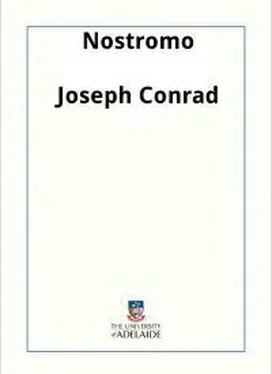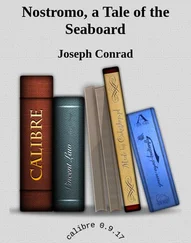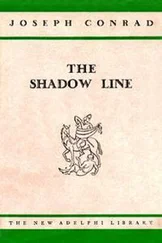Джозеф Конрад - Nostromo - A Tale of the Seaboard
Здесь есть возможность читать онлайн «Джозеф Конрад - Nostromo - A Tale of the Seaboard» весь текст электронной книги совершенно бесплатно (целиком полную версию без сокращений). В некоторых случаях можно слушать аудио, скачать через торрент в формате fb2 и присутствует краткое содержание. Год выпуска: 2006, Жанр: Классическая проза, на английском языке. Описание произведения, (предисловие) а так же отзывы посетителей доступны на портале библиотеки ЛибКат.
- Название:Nostromo: A Tale of the Seaboard
- Автор:
- Жанр:
- Год:2006
- ISBN:нет данных
- Рейтинг книги:4 / 5. Голосов: 1
-
Избранное:Добавить в избранное
- Отзывы:
-
Ваша оценка:
- 80
- 1
- 2
- 3
- 4
- 5
Nostromo: A Tale of the Seaboard: краткое содержание, описание и аннотация
Предлагаем к чтению аннотацию, описание, краткое содержание или предисловие (зависит от того, что написал сам автор книги «Nostromo: A Tale of the Seaboard»). Если вы не нашли необходимую информацию о книге — напишите в комментариях, мы постараемся отыскать её.
Nostromo: A Tale of the Seaboard — читать онлайн бесплатно полную книгу (весь текст) целиком
Ниже представлен текст книги, разбитый по страницам. Система сохранения места последней прочитанной страницы, позволяет с удобством читать онлайн бесплатно книгу «Nostromo: A Tale of the Seaboard», без необходимости каждый раз заново искать на чём Вы остановились. Поставьте закладку, и сможете в любой момент перейти на страницу, на которой закончили чтение.
Интервал:
Закладка:
“That man is calmness personified,” he said, appreciatively, dropping on a bench, and stretching his well-shaped legs in cycling stockings nearly across the doorway. “He must be extremely sure of himself.”
“If that’s all he is sure of, then he is sure of nothing,” said the doctor. He had perched himself again on the end of the table. He nursed his cheek in the palm of one hand, while the other sustained the elbow. “It is the last thing a man ought to be sure of.” The candle, half-consumed and burning dimly with a long wick, lighted up from below his inclined face, whose expression affected by the drawn-in cicatrices in the cheeks, had something vaguely unnatural, an exaggerated remorseful bitterness. As he sat there he had the air of meditating upon sinister things. The engineer-in-chief gazed at him for a time before he protested.
“I really don’t see that. For me there seems to be nothing else. However——”
He was a wise man, but he could not quite conceal his contempt for that sort of paradox; in fact. Dr. Monygham was not liked by the Europeans of Sulaco. His outward aspect of an outcast, which he preserved even in Mrs. Gould’s drawing-room, provoked unfavourable criticism. There could be no doubt of his intelligence; and as he had lived for over twenty years in the country, the pessimism of his outlook could not be altogether ignored. But instinctively, in self-defence of their activities and hopes, his hearers put it to the account of some hidden imperfection in the man’s character. It was known that many years before, when quite young, he had been made by Guzman Bento chief medical officer of the army. Not one of the Europeans then in the service of Costaguana had been so much liked and trusted by the fierce old Dictator.
Afterwards his story was not so clear. It lost itself amongst the innumerable tales of conspiracies and plots against the tyrant as a stream is lost in an arid belt of sandy country before it emerges, diminished and troubled, perhaps, on the other side. The doctor made no secret of it that he had lived for years in the wildest parts of the Republic, wandering with almost unknown Indian tribes in the great forests of the far interior where the great rivers have their sources. But it was mere aimless wandering; he had written nothing, collected nothing, brought nothing for science out of the twilight of the forests, which seemed to cling to his battered personality limping about Sulaco, where it had drifted in casually, only to get stranded on the shores of the sea.
It was also known that he had lived in a state of destitution till the arrival of the Goulds from Europe. Don Carlos and Dona Emilia had taken up the mad English doctor, when it became apparent that for all his savage independence he could be tamed by kindness. Perhaps it was only hunger that had tamed him. In years gone by he had certainly been acquainted with Charles Gould’s father in Sta. Marta; and now, no matter what were the dark passages of his history, as the medical officer of the San Tome mine he became a recognized personality. He was recognized, but not unreservedly accepted. So much defiant eccentricity and such an outspoken scorn for mankind seemed to point to mere recklessness of judgment, the bravado of guilt. Besides, since he had become again of some account, vague whispers had been heard that years ago, when fallen into disgrace and thrown into prison by Guzman Bento at the time of the so-called Great Conspiracy, he had betrayed some of his best friends amongst the conspirators. Nobody pretended to believe that whisper; the whole story of the Great Conspiracy was hopelessly involved and obscure; it is admitted in Costaguana that there never had been a conspiracy except in the diseased imagination of the Tyrant; and, therefore, nothing and no one to betray; though the most distinguished Costaguaneros had been imprisoned and executed upon that accusation. The procedure had dragged on for years, decimating the better class like a pestilence. The mere expression of sorrow for the fate of executed kinsmen had been punished with death. Don Jose Avellanos was perhaps the only one living who knew the whole story of those unspeakable cruelties. He had suffered from them himself, and he, with a shrug of the shoulders and a nervous, jerky gesture of the arm, was wont to put away from him, as it were, every allusion to it. But whatever the reason, Dr. Monygham, a personage in the administration of the Gould Concession, treated with reverent awe by the miners, and indulged in his peculiarities by Mrs. Gould, remained somehow outside the pale.
It was not from any liking for the doctor that the engineer-in-chief had lingered in the inn upon the plain. He liked old Viola much better. He had come to look upon the Albergo d’ltalia Una as a dependence of the railway. Many of his subordinates had their quarters there. Mrs. Gould’s interest in the family conferred upon it a sort of distinction. The engineer-in-chief, with an army of workers under his orders, appreciated the moral influence of the old Garibaldino upon his countrymen. His austere, old-world Republicanism had a severe, soldier-like standard of faithfulness and duty, as if the world were a battlefield where men had to fight for the sake of universal love and brotherhood, instead of a more or less large share of booty.
“Poor old chap!” he said, after he had heard the doctor’s account of Teresa. “He’ll never be able to keep the place going by himself. I shall be sorry.”
“He’s quite alone up there,” grunted Doctor Monygham, with a toss of his heavy head towards the narrow staircase. “Every living soul has cleared out, and Mrs. Gould took the girls away just now. It might not be over-safe for them out here before very long. Of course, as a doctor I can do nothing more here; but she has asked me to stay with old Viola, and as I have no horse to get back to the mine, where I ought to be, I made no difficulty to stay. They can do without me in the town.”
“I have a good mind to remain with you, doctor, till we see whether anything happens to-night at the harbour,” declared the engineer-in-chief. “He must not be molested by Sotillo’s soldiery, who may push on as far as this at once. Sotillo used to be very cordial to me at the Goulds’ and at the club. How that man’ll ever dare to look any of his friends here in the face I can’t imagine.”
“He’ll no doubt begin by shooting some of them to get over the first awkwardness,” said the doctor. “Nothing in this country serves better your military man who has changed sides than a few summary executions.” He spoke with a gloomy positiveness that left no room for protest. The engineer-in-chief did not attempt any. He simply nodded several times regretfully, then said—
“I think we shall be able to mount you in the morning, doctor. Our peons have recovered some of our stampeded horses. By riding hard and taking a wide circuit by Los Hatos and along the edge of the forest, clear of Rincon altogether, you may hope to reach the San Tome bridge without being interfered with. The mine is just now, to my mind, the safest place for anybody at all compromised. I only wish the railway was as difficult to touch.”
“Am I compromised?” Doctor Monygham brought out slowly after a short silence.
“The whole Gould Concession is compromised. It could not have remained for ever outside the political life of the country—if those convulsions may be called life. The thing is—can it be touched? The moment was bound to come when neutrality would become impossible, and Charles Gould understood this well. I believe he is prepared for every extremity. A man of his sort has never contemplated remaining indefinitely at the mercy of ignorance and corruption. It was like being a prisoner in a cavern of banditti with the price of your ransom in your pocket, and buying your life from day to day. Your mere safety, not your liberty, mind, doctor. I know what I am talking about. The image at which you shrug your shoulders is perfectly correct, especially if you conceive such a prisoner endowed with the power of replenishing his pocket by means as remote from the faculties of his captors as if they were magic. You must have understood that as well as I do, doctor. He was in the position of the goose with the golden eggs. I broached this matter to him as far back as Sir John’s visit here. The prisoner of stupid and greedy banditti is always at the mercy of the first imbecile ruffian, who may blow out his brains in a fit of temper or for some prospect of an immediate big haul. The tale of killing the goose with the golden eggs has not been evolved for nothing out of the wisdom of mankind. It is a story that will never grow old. That is why Charles Gould in his deep, dumb way has countenanced the Ribierist Mandate, the first public act that promised him safety on other than venal grounds. Ribierism has failed, as everything merely rational fails in this country. But Gould remains logical in wishing to save this big lot of silver. Decoud’s plan of a counter-revolution may be practicable or not, it may have a chance, or it may not have a chance. With all my experience of this revolutionary continent, I can hardly yet look at their methods seriously. Decoud has been reading to us his draft of a proclamation, and talking very well for two hours about his plan of action. He had arguments which should have appeared solid enough if we, members of old, stable political and national organizations, were not startled by the mere idea of a new State evolved like this out of the head of a scoffing young man fleeing for his life, with a proclamation in his pocket, to a rough, jeering, half-bred swashbuckler, who in this part of the world is called a general. It sounds like a comic fairy tale—and behold, it may come off; because it is true to the very spirit of the country.”
Читать дальшеИнтервал:
Закладка:
Похожие книги на «Nostromo: A Tale of the Seaboard»
Представляем Вашему вниманию похожие книги на «Nostromo: A Tale of the Seaboard» списком для выбора. Мы отобрали схожую по названию и смыслу литературу в надежде предоставить читателям больше вариантов отыскать новые, интересные, ещё непрочитанные произведения.
Обсуждение, отзывы о книге «Nostromo: A Tale of the Seaboard» и просто собственные мнения читателей. Оставьте ваши комментарии, напишите, что Вы думаете о произведении, его смысле или главных героях. Укажите что конкретно понравилось, а что нет, и почему Вы так считаете.












